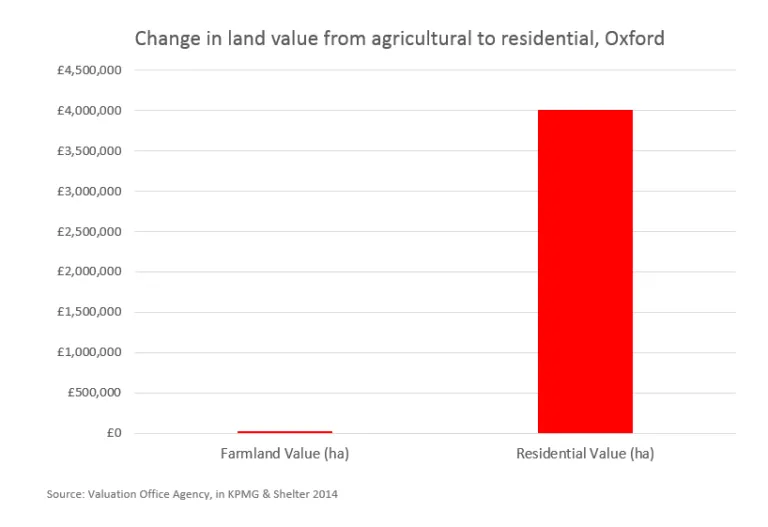Who should pay for affordable homes?
Published: by Pete Jefferys
Any regular readers of this blog will know that we need to build many more homes in England, especially more genuinely affordable homes. The need for these homes can’t be ducked any longer. However, there is a pressing question: who should pay for tens of thousands more affordable homes at a time of squeezed budgets?
As well as the need for government to prioritise investment in affordable housing (we say an extra £1.2bn per year), and the need to lever in more institutional private investment, I would suggest another important source: lucky landowners. To be clear, this doesn’t mean all landowners – just those who gain a windfall from the current planning system.
Our current housing market disproportionately rewards people who own land – especially farmland near our big cities. The reason is simple, the shortage of homes in places where people want to live makes house prices and rents really high. So if you can take a piece of farmland near a city and get permission to build houses on it, then the value of that land rockets. The latest available data showed that taking a field outside Oxford and giving it planning permission for homes would increase its value by a staggering 200 times (from around £20,000 a hectare to £4m a hectare).
For these landowners, this is tantamount to winning the lottery. Nothing has been built, no family is in a new home but the value of their asset now makes them a multi-millionaire. Lucky them.
Unfortunately, the sky-high land prices mean that the homes must be sold at high prices for builders to turn a profit. This means new homes end up being unaffordable to local people, there’s little money left for decent local infrastructure, and builders are forced to squeeze as many tiny homes on to the land as possible to maximise returns. No wonder so many people object to new development.
At present, councils can ask developers to make small contributions to infrastructure and affordable homes as the price of planning permission – but it doesn’t bring in that much, and local councils’ powers to do these deals are being progressively weakened.
However there is an alternative way of funding quality development. We think far more of the boom in land value that comes from planning permission should fund genuinely affordable homes and better local infrastructure (schools, hospitals, parks, transport). This means that landowners would get less, but the money would go into infrastructure and affordable homes. It would reduce the pressure on government budgets for affordable housing.
For example, would it be unfair for landowners to get 150% of the current value of their plot, with the rest of the cash invested for community benefit? This is how new development works in many other countries like Germany and the Netherlands and not only means that more affordable homes are built, but also that new homes are typically larger, higher quality and cheaper (even in high density Holland).
In the UK the principle of windfall taxes, which this could be argued to be, is a well-established one. In the late 1990s, a windfall tax was levied on the privatised utilities with the justification that they had been under-priced by the public sector when sold, after decades of public investment. Similarly, the private windfall from the land market can only exist when public policy has intervened, both through planning and investment in infrastructure. With Sir John Major making a recent call for another windfall tax, perhaps lucky landowners would be the best source?
……..
Who are these lucky landowners?
The answer to this simple question is hard to fathom because there’s so little data available (something we want to see changed). However, it’s safe to say that landowners are a mixed bag.
They include the major house-builders themselves, who hold strategic land-banks. There are also big institutional land-owners, many of whom are in the public sector – like the MOD, the NHS, councils, universities and the Church of England. And there are wealthy individuals who may have inherited ownership, like the landed aristocracy, or even foreign investors getting in on our booming agricultural land market.
In the London market, a 2012 report [PDF] found that around half of the owners of land with planning permission for homes were firms which do not actually build. This indicates the existence of speculative middle-men pushing up the price of land, trading it and profiting off it at the country’s expense, without building any homes. There’s no wider economic benefit to this sort of activity, compared to the huge benefits of building more affordable homes.
While these lucky landowners will no doubt oppose reform, it’s hard to see how their vested interest can be justified. After all, we’re still proposing that they still take a 50% margin on their asset for potentially doing nothing. That’s a massive reward and the public are hardly likely to shed many tears for them.
High land prices are holding back our ability to build the affordable homes we need. It’s time that landowners got a bit less, and local communities got a bit more.
